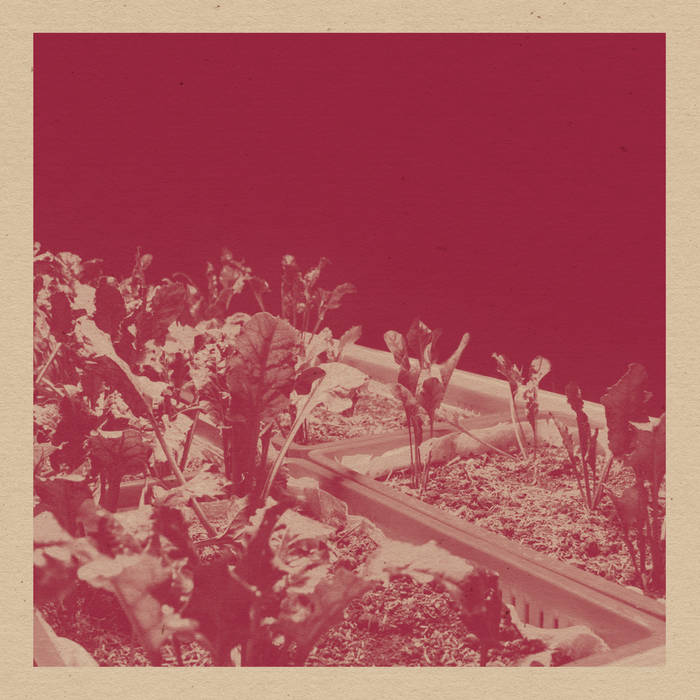David Vélez // Beta Vulgaris CD
- Availability:
This is the latest album released by Colombian sound artist / Dr. David Vélez in December 2022 from Polish experimental label Sublime Retreat.
Includes 5 ultra-minimal and sound drone songs created to promote the growth of bright red vegetable beets.Digipak, shrink specification. Comes with an 8-page booklet.
It can be enjoyed not only by farmers but also as a drone work.Below is a commentary by the label and writer.
This piece was composed by David Vélez to promote the growth of beets, inspired by its unique taste, color and shape, as well as its excellent nutritional and medicinal properties.Performed in David's own little farm and museum garden in Columbia, the beets grew big, beautiful, wholesome and delicious.
This project invites us to think of urban and home farming as a means of asserting political and dietary autonomy, allied with beetroot and its extraordinary nutritional, medicinal and aesthetic potency.
David Velez earned his PhD in Sound Art in the UK for his work on the relationship between sound and food.
Preliminary consideration
The philosopher Michael Murder writes about prolonged close encounters with plants, which show that time slows down and loses its sense of passage.He suggests that such alterations in time perception help establish proximity with these creatures.In such intimate encounters with plants, Murder perceives that he is with himself in such a way that he ceases to be himself.Here he finds himself meditating in silence, experiencing continuity in the sound realm.Research shows that farming helps tune the body to circadian rhythms, which can beneficially affect our well-being and reduce the risk of depressive symptoms.
Biologist Edward O. Wilson believes that humans' attraction to plants and non-humans has to do with millions of years of symbiotic adaptation and genetic co-evolution, in which all species interact with others around them. He points out that he recognizes himself as a collaborator and co-author of his current gene development.
Horticulturalist Paula Diane Relf recognizes certain aspects of the positive effects of agriculture on well-being.She supports that therapeutic agriculture can act as an insightful catharsis, stimulating great observation and empathy.
BETA VULGARIS
Jeanne McHale is a physical chemist who analyzes beetroot and utilizes its unique color component, betanin, to develop sustainable solar energy systems.He is researching solar cells as an alternative to photovoltaics.Solar cell toxicity is the main reason solar energy is unsustainable. McHale's research will help mitigate the energy crisis, one of the leading causes of the current climate crisis.
Chemistry researchers Li-June Ming and DM Jonathan Burdette suggest that betanin increases blood flow to the brain and improves certain cognitive functions.Ming is studying the composition of betanin to slow the rate at which Alzheimer's disease attacks the brain.Alzheimer's disease develops when the brain's stored energy is depleted and unable to counteract the negative effects of entropy.Given the ongoing Alzheimer's epidemic, Ming's research could benefit millions and save thousands of lives.
David Vélez composed this work, thinking of the beet plants as collaborators and establishing a subjective acoustic convergence point that could contribute to their perception of sound.For this,David examined the theory of plant acoustics in botany and agriculture.in the studioWhen the beets were grown and acoustic stimuli were applied, excellent results were obtained. After 3 months, she was healthy, abundant and growing beautifully.The Museum of Modern Art in Medellín has since recreated this process with similar success, leading to beetroot cooking classes.The theory studied by David is as follows.
(a) The project "Sonic bloom organic farming made easy!" by Dan Carlson, a researcher in agricultural acoustics, played an important role in the composition of this work.Radha Hasanien's idea, read in the paper Advances in Effects of Sound Waves on Plants, suggests that plants respond favorably to sine waves above 3,000 Hz.According to Carlson, these sounds can promote plant growth, increase yields, encourage leaf and flower development, increase disease resistance, and increase nutrient uptake. A sine wave of 3,000 Hz or higher has the effect of opening the stomata in the epidermis of stems and leaves and improving the absorption of necessary substances such as nitrogen and water.
(b) To stimulate plants, David also examined the paper Plants respond to leaf vibrations caused by insect herbivore chewing by Heidi Appel and Rex Cocroft.The paper studies that these sounds can strengthen the plant's immune system.The composer pursues proximity, texture, movement and detail,I decided to reproduce them using cooking sounds recorded from cooking beets.
(c) Axel Michelsen, studying the relationship between insects, plants, and sound, suggests that some insects use vegetables as acoustic transducers to amplify sound.Insect calls are often inaudible and need to be amplified by plants.
Sublime Retreat Other worksplease use this form. ///Click here to see more Sublime Retreat releases available at Tobira.
-----------------------------
Edition of 100.
Beta Vulgaris was composed by David Vélez to stimulate the growth of beetroot after his interest in its unique taste, color, and shape and its superb nutritional and medicinal value. It was played in David's own small domestic crop of beets and in the garden of a museum in Colombia, and they grew big, beautiful, healthy and delicious.
This project is an invitation to consider urban and domestic agriculture as means to claim political and alimentary autonomy in alliance with beets and their extraordinary nutritional, medicinal and aesthetic potency.
For his research work on the relationship between sound and food, David Velez was awarded PhD in Sound Art in the UK.
PRELIMINARY CONSIDERATIONS
Philosopher Michael Marder writes about his extended and close encounters with plants, indicating experiencing time deceleration and losing track of its lapse. He suggests that these changes in time perception help him establish proximity with these organisms. that he is together with himself in a way in which he becomes himself otherwise. in silence while experiencing continuity in the streaming realm of sound. Studies show that farming synchronises the body to circadian rhythms which has beneficial effects on our well-being, helping decrease the risk of depression symptoms.
Biologist Edward O. Wilson suggests that the attraction of humans to plants, and other non-human organisms, is connected with millions of years of symbiotic adaptation and genetic coevolution, where every species perceives the others around as collaborators and co-authors of its current genetic development.
Horticulturist Paula Diane Relf acknowledges the positive effects of farming in well-being operating in specifc aspects. She supports that therapeutic farming can operate as an insightful catharsis that stimulates great observation capacity and a greater sense of empathy.
BETA VULGARIS
Jeanne McHale is a researcher in physical chemistry who analyzes beets to develop sustainable solar energy systems by working with betanin, the component that gives them their unique colour. She studies it to replace photovoltaic cells in solar panels. reason why solar energy is unsustainable. The research of McHale could help alleviate the energy crisis which is one of the leading causes of the current crisis climate.
Betanin stimulates blood flow to the brain and improves certain cognitive functions, as suggested by chemistry researchers Li-June Ming and DM Jonathan Burdette. Ming studies the composition of betanin to slow down the speed at which Alzheimer's attacks the brain. Energy reserves accumulated in the brain decreases, and the brain can no longer counteract the detrimental effects of entropy. Considering the ongoing Alzheimer's epidemic, Ming's research could benefit millions and save thousands of lives, as revealed by the most recent public health statistics.
David Vélez composed this piece considering beetroot plants as collaborators, hence the need to establish a point of intersubjective acoustic convergence in which he could engage with their perception of sound. his studio, he grew beets while acoustically stimulating them with great results. After three months, they grew healthy, exuberant and exquisite. Later, in the Modern Art Museum in Medellin, the process was replicated with equal success, leading to a culinary workshop on beets.
(a) The project Sonic bloom organic farming made easy! by the researcher in agricultural acoustics, Dan Carlson, was crucial in the composition of this piece. His ideas, which David read about in the essay Advances in Effects of Sound Waves on Plants, authored by Rada Hassanien, suggest that plants show a positive reaction to sinusoidal waves above 3,000 Hz. For Carlson, these sounds can accelerate the growth of plants, increase the volume of the harvest, stimulate the development of leaves and flowers, improve resistance to diseases Sine tones over 3,000 Hz open the stomata in the epidermis of stems and leaves and encourage better absorption of nitrogen, water, and other essential substances, he suggests.
(b) To stimulate the plants, David also examined the paper Plants respond to leaf vibrations caused by insect herbivore chewing, authored by Heidi Appel and Rex Cocroft, whose research suggests that these sounds can strengthen the immune system of plants. They using cooking sounds recorded from beet preparations pursuing proximity, textures, movement and detail.
(c) Axel Michelsen studies the relation between insects, plants and sound and suggests that some insect species use vegetables as acoustic transducers to amplify their sounds.
Artist: Bruno Duplant
Label: Sublime Retreat
This is the latest album released by Colombian sound artist / Dr. David Vélez in December 2022 from Polish experimental label Sublime Retreat.
Includes 5 ultra-minimal and sound drone songs created to promote the growth of bright red vegetable beets.Digipak, shrink specification. Comes with an 8-page booklet.
It can be enjoyed not only by farmers but also as a drone work.Below is a commentary by the label and writer.
This piece was composed by David Vélez to promote the growth of beets, inspired by its unique taste, color and shape, as well as its excellent nutritional and medicinal properties.Performed in David's own little farm and museum garden in Columbia, the beets grew big, beautiful, wholesome and delicious.
This project invites us to think of urban and home farming as a means of asserting political and dietary autonomy, allied with beetroot and its extraordinary nutritional, medicinal and aesthetic potency.
David Velez earned his PhD in Sound Art in the UK for his work on the relationship between sound and food.
Preliminary consideration
The philosopher Michael Murder writes about prolonged close encounters with plants, which show that time slows down and loses its sense of passage.He suggests that such alterations in time perception help establish proximity with these creatures.In such intimate encounters with plants, Murder perceives that he is with himself in such a way that he ceases to be himself.Here he finds himself meditating in silence, experiencing continuity in the sound realm.Research shows that farming helps tune the body to circadian rhythms, which can beneficially affect our well-being and reduce the risk of depressive symptoms.
Biologist Edward O. Wilson believes that humans' attraction to plants and non-humans has to do with millions of years of symbiotic adaptation and genetic co-evolution, in which all species interact with others around them. He points out that he recognizes himself as a collaborator and co-author of his current gene development.
Horticulturalist Paula Diane Relf recognizes certain aspects of the positive effects of agriculture on well-being.She supports that therapeutic agriculture can act as an insightful catharsis, stimulating great observation and empathy.
BETA VULGARIS
Jeanne McHale is a physical chemist who analyzes beetroot and utilizes its unique color component, betanin, to develop sustainable solar energy systems.He is researching solar cells as an alternative to photovoltaics.Solar cell toxicity is the main reason solar energy is unsustainable. McHale's research will help mitigate the energy crisis, one of the leading causes of the current climate crisis.
Chemistry researchers Li-June Ming and DM Jonathan Burdette suggest that betanin increases blood flow to the brain and improves certain cognitive functions.Ming is studying the composition of betanin to slow the rate at which Alzheimer's disease attacks the brain.Alzheimer's disease develops when the brain's stored energy is depleted and unable to counteract the negative effects of entropy.Given the ongoing Alzheimer's epidemic, Ming's research could benefit millions and save thousands of lives.
David Vélez composed this work, thinking of the beet plants as collaborators and establishing a subjective acoustic convergence point that could contribute to their perception of sound.For this,David examined the theory of plant acoustics in botany and agriculture.in the studioWhen the beets were grown and acoustic stimuli were applied, excellent results were obtained. After 3 months, she was healthy, abundant and growing beautifully.The Museum of Modern Art in Medellín has since recreated this process with similar success, leading to beetroot cooking classes.The theory studied by David is as follows.
(a) The project "Sonic bloom organic farming made easy!" by Dan Carlson, a researcher in agricultural acoustics, played an important role in the composition of this work.Radha Hasanien's idea, read in the paper Advances in Effects of Sound Waves on Plants, suggests that plants respond favorably to sine waves above 3,000 Hz.According to Carlson, these sounds can promote plant growth, increase yields, encourage leaf and flower development, increase disease resistance, and increase nutrient uptake. A sine wave of 3,000 Hz or higher has the effect of opening the stomata in the epidermis of stems and leaves and improving the absorption of necessary substances such as nitrogen and water.
(b) To stimulate plants, David also examined the paper Plants respond to leaf vibrations caused by insect herbivore chewing by Heidi Appel and Rex Cocroft.The paper studies that these sounds can strengthen the plant's immune system.The composer pursues proximity, texture, movement and detail,I decided to reproduce them using cooking sounds recorded from cooking beets.
(c) Axel Michelsen, studying the relationship between insects, plants, and sound, suggests that some insects use vegetables as acoustic transducers to amplify sound.Insect calls are often inaudible and need to be amplified by plants.
Sublime Retreat Other worksplease use this form. ///Click here to see more Sublime Retreat releases available at Tobira.
-----------------------------
Edition of 100.
Beta Vulgaris was composed by David Vélez to stimulate the growth of beetroot after his interest in its unique taste, color, and shape and its superb nutritional and medicinal value. It was played in David's own small domestic crop of beets and in the garden of a museum in Colombia, and they grew big, beautiful, healthy and delicious.
This project is an invitation to consider urban and domestic agriculture as means to claim political and alimentary autonomy in alliance with beets and their extraordinary nutritional, medicinal and aesthetic potency.
For his research work on the relationship between sound and food, David Velez was awarded PhD in Sound Art in the UK.
PRELIMINARY CONSIDERATIONS
Philosopher Michael Marder writes about his extended and close encounters with plants, indicating experiencing time deceleration and losing track of its lapse. He suggests that these changes in time perception help him establish proximity with these organisms. that he is together with himself in a way in which he becomes himself otherwise. in silence while experiencing continuity in the streaming realm of sound. Studies show that farming synchronises the body to circadian rhythms which has beneficial effects on our well-being, helping decrease the risk of depression symptoms.
Biologist Edward O. Wilson suggests that the attraction of humans to plants, and other non-human organisms, is connected with millions of years of symbiotic adaptation and genetic coevolution, where every species perceives the others around as collaborators and co-authors of its current genetic development.
Horticulturist Paula Diane Relf acknowledges the positive effects of farming in well-being operating in specifc aspects. She supports that therapeutic farming can operate as an insightful catharsis that stimulates great observation capacity and a greater sense of empathy.
BETA VULGARIS
Jeanne McHale is a researcher in physical chemistry who analyzes beets to develop sustainable solar energy systems by working with betanin, the component that gives them their unique colour. She studies it to replace photovoltaic cells in solar panels. reason why solar energy is unsustainable. The research of McHale could help alleviate the energy crisis which is one of the leading causes of the current crisis climate.
Betanin stimulates blood flow to the brain and improves certain cognitive functions, as suggested by chemistry researchers Li-June Ming and DM Jonathan Burdette. Ming studies the composition of betanin to slow down the speed at which Alzheimer's attacks the brain. Energy reserves accumulated in the brain decreases, and the brain can no longer counteract the detrimental effects of entropy. Considering the ongoing Alzheimer's epidemic, Ming's research could benefit millions and save thousands of lives, as revealed by the most recent public health statistics.
David Vélez composed this piece considering beetroot plants as collaborators, hence the need to establish a point of intersubjective acoustic convergence in which he could engage with their perception of sound. his studio, he grew beets while acoustically stimulating them with great results. After three months, they grew healthy, exuberant and exquisite. Later, in the Modern Art Museum in Medellin, the process was replicated with equal success, leading to a culinary workshop on beets.
(a) The project Sonic bloom organic farming made easy! by the researcher in agricultural acoustics, Dan Carlson, was crucial in the composition of this piece. His ideas, which David read about in the essay Advances in Effects of Sound Waves on Plants, authored by Rada Hassanien, suggest that plants show a positive reaction to sinusoidal waves above 3,000 Hz. For Carlson, these sounds can accelerate the growth of plants, increase the volume of the harvest, stimulate the development of leaves and flowers, improve resistance to diseases Sine tones over 3,000 Hz open the stomata in the epidermis of stems and leaves and encourage better absorption of nitrogen, water, and other essential substances, he suggests.
(b) To stimulate the plants, David also examined the paper Plants respond to leaf vibrations caused by insect herbivore chewing, authored by Heidi Appel and Rex Cocroft, whose research suggests that these sounds can strengthen the immune system of plants. They using cooking sounds recorded from beet preparations pursuing proximity, textures, movement and detail.
(c) Axel Michelsen studies the relation between insects, plants and sound and suggests that some insect species use vegetables as acoustic transducers to amplify their sounds.
Artist: Bruno Duplant
Label: Sublime Retreat






